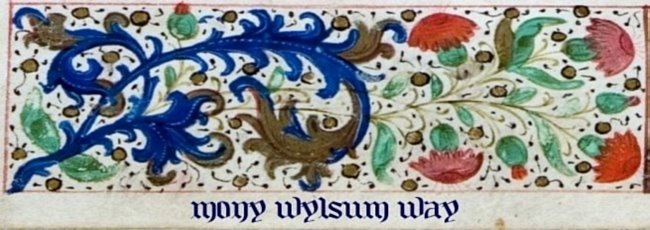John of Salisbury was on the brink of distinguishing three meanings for the verb legere, but then leaves it at two. He says that the word ‘to read’ is equivocal, indicating either the activity of a teacher reading out and a listening learner (‘docentis et discentis’) or that of studying what is written for oneself (‘per se scrutantis scripturam’). John therefore refers to three different persons (teacher, learner, individual reader), but lumps the first two together by seeing them under prelectio, the communication between teacher and pupil, as distinct from lectio, individual reading. By thus squeezing out the learner-listener (discens) from the usage of legere, John has confined himself to a double function of this verb. He therefore remains content with the suggested distinction between prelegere (to read aloud to others) and legere (to read for oneself).[1]
That distinction that John of Salibury doesn't quite commit to is actually quite an interesting one if it's fully articulated. And if it isn't, that is in itself interesting. When we analyse mediaeval reading patterns, do we consider locutor and audens to be one single unit, the lector? When we read a mediaeval reference to a specific act of reading, does the author of the reference consider them as a single unit, and if not, where is his/her focus? To whom is the verb legere given - where does the credit lie?
If we consider (or our hypothetical author considers) the speaker to be the reader, we foreground the skill of reading - in other words, we buy into (or examine) the cultural stratification around that ability that was for so long the closely guarded property and defining characteristic of clerics. If we consider the hearer to be the reader[2], we foreground instead the act of comprehension - involvement in a specific moment rather than intellectual accomplishment, internal analytical processes rather than external processing - and open possibilities for the meaning of 'legere' approaching, for example, spiritual contemplation. This might also tie in, depending on period and author, with the opposition of mouth and ear, and the concerns over positive and negative functions of speech.
I don't suggest that either is more correct - I simply think it's a distinction that is valuable to bear in mind when reading mediaeval accounts of such moments, to see which figure/idea is foregrounded by the author, or to reserve our own ability to analyse the scene from both angles.
[1] D. H. Green, Women Readers in the Middle Ages. Cambridge: Cambridge UP, 2007, 5-6. Internal quotes are John of Salisbury, Metalogicon I 24 (qtd in Green, Medieval listening and reading: The primary reception of German literature 800-1300, Cambridge: Cambridge UP, 1994, 337 n. 155).
[2] The speaker may also be a hearer, and thus a reader under this definition, but not invariably.


.jpg)


No comments:
Post a Comment